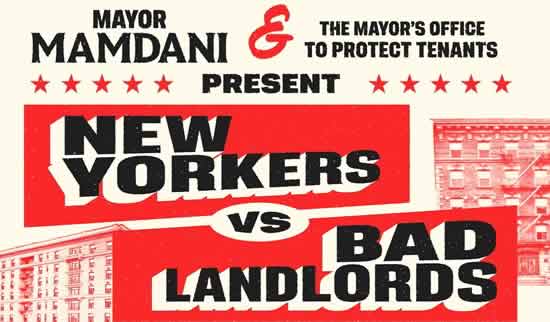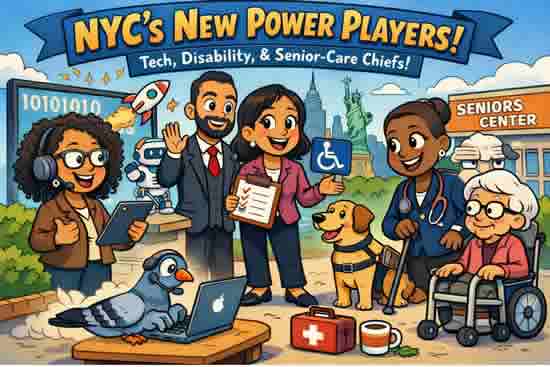Mayor Eric Adams testified before state lawmakers, pushing for key policies to help working-class New Yorkers. He urged Albany to pass his “Axe the Tax for the Working Class” plan, cutting city income taxes for low-income residents, and backed the “Supportive Interventions Act” to get better care for those with severe mental illness. Adams also called for discovery law reforms to improve the justice system and pressed for more state funding to handle the city’s asylum seeker crisis. Highlighting job growth and lower crime, he stressed the need for state support to keep NYC thriving.
– New York City Mayor Eric Adams today provided testimony to the New York State Senate Local Government/General Government, Finance and the New York State Assembly Ways and Means Committees, focusing on the administration’s agenda in Albany as Mayor Adams works to make New York City the best place to raise a family. Mayor Adams, today, asked for the state Legislature’s help in passing his “Axe the Tax for the Working Class” legislation that will eliminate and cut New York City personal income taxes for working-class New Yorkers, passing the “Supportive Interventions Act” to finally allow people with severe mental illness to get the lasting support they need, and passing measured reforms to the discovery law that will continue to protect defendants’ rights, while improving the efficiency of the criminal justice system. Finally, Mayor Adams outlined the city’s strong fiscal management and fiscal challenges, including state funding for asylum seekers, while asking for continued financial support to manage the international asylum seeker crisis that has landed at the city’s front door.
Below are Mayor Adams’ remarks as prepared for delivery:
Thank you, Chairs Krueger, and Pretlow, Cities Chairs Sepúlveda and Burke, Local Government Chairs Martinez and Jones, and members of the Assembly Ways and Means and Senate Finance committees.
My name is Eric Adams, and I am the mayor of the City of New York.
I’m proud to be here today with Jacques Jiha, director of our Office of Management and Budget, First Deputy Mayor Maria Torres-Springer, Deputy Mayor for Intergovernmental Affairs Tiffany Raspberry, and former state senator and Senior Advisor to the Mayor Diane Savino.
Since day one of our administration, our mission has been to make New York City a safer, more affordable city that is the best place to raise a family.
While we have more to do, we have made significant progress.
Crime is down on our streets and in the subways. In 2024, homicides and shootings reduced for the third consecutive year — and are both down double digits since we came into office.
What’s more, our January crime statistics are now out, and for the second month in a row, overall crime in our city is down by double digits.
Last month, crime was down 17 percent above ground and 36 percent below ground.
Shootings were also down 22 percent last month — continuing the steady decrease we’ve seen as we have taken over 20,000 illegal guns off our streets.
We currently have an all-time high number of jobs in our city and broke the record for the most jobs in New York City’s history eight times over the course of our administration.
And — this is important — unemployment has dropped in all demographics, with Black and Hispanic both down more than 20 percent since we came into office.
These achievements would not be possible without our strong fiscal management.
We have delivered three balanced budgets; The nation’s leading, independent, credit rating agencies have affirmed our strong fiscal standing; And our most recent preliminary budget includes the largest-ever capital plan for housing, infrastructure, schools, libraries, and more.
Last year, we worked closely with you and the governor to make progress on every single one of our legislative priorities.
Together, we passed historic legislation that protects tenants and gives our city new tools to build the affordable housing needed to tackle a generational housing crisis;
We won mayoral accountability for the second time. We gained legal authority to close illegal cannabis shops, which has led to shutting down over 1,300 illegal shops through ‘Operation Padlock to Protect;’
We passed legislation on red-light cameras and e-bikes to keep our streets safe;
And, all this builds on our past work, in partnership, to:
Expand the Earned Income Tax for the first time in 20 years that has now put more than $345 million back in the pockets of New Yorkers, allocate aid to the unprecedented international humanitarian crisis we face together, and so much more.
That is why I am here today to talk about our shared priorities and how we plan to work with the Legislature to, once-again, deliver for working-class people. We are seeking support in four key areas:
- First, passage of our “Axe the Tax for the Working Class” legislation to make life more affordable for working-class New Yorkers.
- Second, passage of the “Supportive Interventions Act” to finally allow people with severe mental illness to get the lasting support they need.
- Third, passage of measured reforms to the discovery law that will continue to protect defendants’ rights, while improving the efficiency of our criminal justice system and keeping our city safe.
- And, finally, continued financial support to manage the international asylum seeker international crisis that has landed at our city’s front door.
More specifically, our administration is committed to making our city more affordable and has taken historic measures to do just that.
Last year, we celebrated back-to-back record-breaking years for producing and connecting New Yorkers with new, affordable homes.
We also passed our “City of Yes for Housing Opportunity” plan — the most significant pro-housing reform in our city’s history.
And, with Governor Hochul and the state’s support, “City of Yes” will invest 5-billion-dollars.
These investments, combined with our generational zoning reforms, will create over 80,000 new homes over the next 15 years across every neighborhood in the five boroughs.
Working-class New Yorkers must also be able to afford groceries, medicine, transportation, and other necessities. Every penny counts for our families.
To help them, we have put more than $30 billion back into the pockets of working-class people.
Over the next three years, we will cancel over $2 billion in medical debt for over half a million of our city’s residents.
But there is much more we can do to build on this progress.
That is why, today, I am asking you to support our “Axe the Tax for the Working Class” plan that would eliminate or cut city personal income taxes for low-income New Yorkers.
At a moment when our state faces a historic affordability crisis, this bold action will generate an average benefit of $350, putting a total of more than $63 million back into the pockets of low-income families, and help more than 582,000 filers and their dependents.
As I’ve said over and over, public safety is the prerequisite to prosperity.
We are providing even more support for New Yorkers living on the streets and in the subways, including those struggling with serious mental illness, and those at risk of entering city shelters through a historic $650 million plan.
We are adding 900 more Safe Haven beds and 100 Runaway Homeless Youth beds to protect our most vulnerable. We have also restored all of the psychiatric beds in our public hospital system that were closed during the pandemic.
We are launching our “Bridge to Home” program, an innovative model to provide homeless New Yorkers with serious mental illness the intensive support they need after discharge from a hospital, to break the cycle of returning to the streets.
Our administration has already moved 2,800 people from streets and subways to permanent housing, and we have launched outreach programs, such as SCOUT and PATH, which bring law-enforcement and trained clinical professionals onto our subway system to get people the help they need.
I have been very clear: our subways are not a hospital and the days of ignoring people in need are over.
That is why it is time to enact the Supportive Interventions Act, which clarifies that a person requires hospitalization if mental illness is preventing them from meeting their basic human needs of food, clothing, shelter, or medical care.
It will also help ensure people remain hospitalized until they are truly ready for discharge and receive “assisted outpatient treatment” afterwards if they need that level of ongoing support.
We are grateful for the governor’s embrace of many of these proposals and look forward to working with you to pass meaningful reforms this year.
Next, we also must do more to ensure repeat offenders are truly held accountable and keep our communities safe.
Well-meaning criminal justice reform has led to an unintended consequence. This includes dismissals of cases due to minor violations of burdensome discovery rules, also causing remaining cases to take longer, leading people to linger on Rikers Island longer.
We ask you to support an approach that balances a defendant’s rights with the smooth functioning of our criminal justice system, speeding along cases and preventing needless technical dismissals.
This will help us reduce our jail populations and keep our people safe.
Finally, as I have said many times, no city should have to shoulder the costs of an international humanitarian crisis on its own.
Our Fiscal Year 2026 Preliminary Budget is balanced and includes $2.4 billion in savings in this fiscal year and the next related to the decline in migrant arrivals over the past 31 weeks.
This trend is due to the steps we have taken to put more than 184,000 migrants on the path to self-sufficiency, and federal border policies we had advocated for.
These measures helped reduce the number of asylum seekers in our care from a high of 69,000 in January 2024 to less than 47,000 today.
However, we have still spent more than $6.9 billion to care for the immigrants over just three fiscal years and anticipate spending billions more in the years to come.
While we appreciate the contributions the state has made, we urge you to include asylum seeker funding for the city in the state enacted budget.
Without your help, we will have to close a $1.1 billion budget shortfall for this program within 12 weeks and ask for the state’s assistance to do so.
This is on top of the costs of complying with new state budget provisions that will cost New York City taxpayers $165 million more annually for MTA needs and $347 million from lower-than-expected Foundation Aid.
To conclude, we appreciate the successful legislative session we had together last year, and in the two years prior, and the resources you have directed to New Yorkers.
From housing reform to mayoral accountability, to increasing our debt capacity so we can continue to build the New York City of the future, your partnership has helped this city prosper and thrive.
We have high hopes for this year as well. We are looking forward to working with you as we fight to make New York a safer, more affordable city, and the best place to live and raise a family for generations to come.
Thank you, and I look forward to answering your questions.
February 4, 2025 NEW YORK
Sources: NYC.gov, Midtown Tribune
Bigny.com news
#MayorAdams #NYC #TaxCuts #MentalHealth #AsylumCrisis #PublicSafety #Albany #WorkingClass #JusticeReform #NYPolitics










